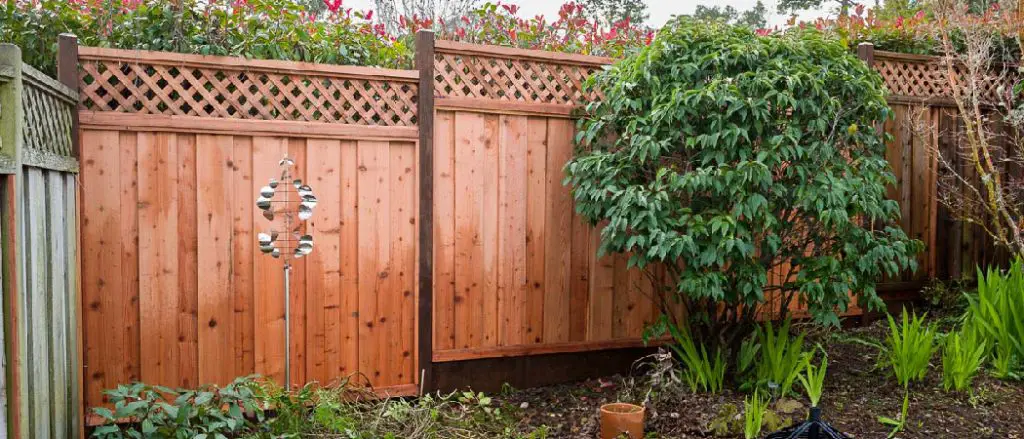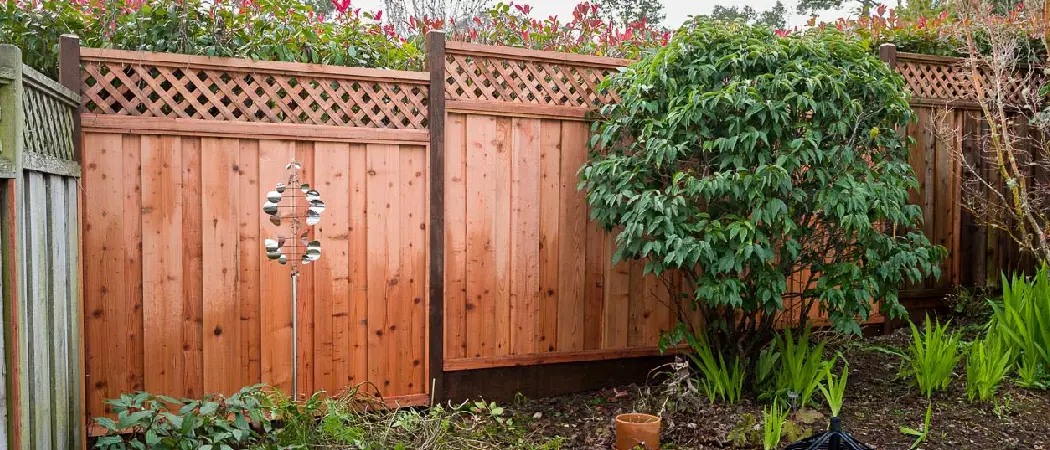To soundproof a fence, you can add mass with heavy materials like mass-loaded vinyl and install acoustic panels to absorb sound. Soundproofing a fence is essential for privacy and noise reduction in outdoor spaces.
By taking a few simple steps, you can create a quiet and peaceful environment in your backyard. Whether you want to block out street noise or maintain privacy from neighbors, soundproofing your fence can make a significant difference. In this guide, we will explore various techniques and materials you can use to effectively soundproof your fence and enjoy a quieter outdoor living space.
Let’s dive into the details of how to soundproof a fence efficiently and effectively.

Understanding Noise Pollution
Easily reduce noise pollution by soundproofing your fence. Simple solutions like adding plants or using acoustic panels can effectively minimize sound transmission. Understanding noise pollution and implementing soundproofing techniques can create a peaceful and quiet outdoor space.
Causes Of Noise Pollution
Noise pollution can disrupt our peace and quiet, making it difficult to relax or concentrate. Understanding the causes of noise pollution is crucial in finding effective solutions. Here are the common sources:
- Transportation: Busy roads, highways, and airports generate constant noise from vehicles, aircraft, and trains.
- Industrial Activities: Factories, construction sites, and machinery produce continuous and sometimes unbearable noise levels.
- Outdoor Recreational Activities: Parks, playgrounds, and stadiums can become noise hotspots during events or sports activities.
- Neighborhood Noise: Loud music, barking dogs, and noisy gatherings can disturb the tranquility in residential areas.
- Commercial Establishments: Restaurants, bars, and shopping centers often contribute to noise pollution due to the hustle and bustle of customers and business operations.
Effects Of Noise Pollution
Noise pollution has various detrimental effects on our well-being, both physically and mentally. These effects can be short-term or long-term, and they may include:
- Stress and Anxiety: Continuous exposure to loud noise can lead to heightened stress levels and anxiety, impacting overall mental health.
- Sleep Disturbance: Noise pollution disrupts our sleep patterns, making it harder to fall asleep or stay asleep, leading to insomnia.
- Hearing Loss: Prolonged exposure to high levels of noise can cause permanent damage to our hearing, resulting in partial or complete hearing loss.
- Impaired Concentration: Excessive noise can make it challenging to concentrate, affecting productivity at work or school.
- Cardiovascular Issues: Elevated noise levels can raise blood pressure, increase heart rate, and contribute to cardiovascular problems.
Choosing The Right Fence
When it comes to soundproofing a fence, choosing the right fence is essential. The fence material and design play a crucial role in reducing noise levels. To create an effective sound barrier, consider the following factors.
Materials That Help Reduce Noise
- Vinyl: Absorbs and deflects sound waves effectively.
- Wood: Thick wooden fences act as natural sound barriers.
- Composite: Offers a blend of wood and plastic properties for noise reduction.
Factors To Consider When Selecting A Fence
- Height: Taller fences provide better sound attenuation.
- Density: Opt for solid panels rather than spaced designs.
- Thickness: Thicker materials offer more noise reduction.
- Texture: Irregular surfaces can disrupt sound waves.
- Sealing: Properly seal gaps and joints to prevent sound leakage.
Preparation
Soundproofing a fence is a great way to create a peaceful and serene outdoor environment. To achieve effective soundproofing, proper preparation is crucial. This involves checking local regulations and permits, measuring the fence area, and assessing current noise levels.
Checking Local Regulations And Permits
- Research the noise ordinances and fence height restrictions in your local area.
- Obtain any necessary permits or approvals before proceeding with the soundproofing project.
Measuring The Fence Area
Take accurate measurements of the entire fence area to determine the materials needed for soundproofing.
Assessing Current Noise Levels
- Use a decibel meter to measure the existing noise levels around your property.
- Identify the sources of noise and the areas where soundproofing is most needed.
Soundproofing Methods
When soundproofing a fence, there are several effective methods that can help reduce noise transmission. Each method serves a unique purpose, from absorbing sound waves to blocking unwanted noise. Let’s explore some soundproofing techniques:
Installing Acoustic Panels
Acoustic panels can be added to a fence to absorb and dampen sound waves, reducing noise levels significantly.
Using Mass-loaded Vinyl
Mass-loaded vinyl is a dense material that can be wrapped around a fence to add mass and block noise from passing through.
Insulating The Fence
Insulating the fence with soundproofing materials like foam boards or fiberglass can help reduce the impact of noise.
Creating A Double-layered Fence
Building a double-layered fence involves constructing a secondary fence parallel to the existing one, creating a barrier that further blocks noise.
Additional Noise Reduction Techniques
If you’re serious about soundproofing your fence and creating a peaceful oasis in your backyard, there are additional techniques you can employ. These methods go beyond the standard soundproofing materials and offer creative solutions to minimize noise. Let’s explore some of these techniques below.
Landscaping For Noise Reduction
One effective way to reduce noise around your fence is by strategically planning your landscaping. By utilizing the right plants and features, you can create a natural barrier that absorbs and blocks sound waves. Here are a few landscaping techniques you can try:
- Planting trees along the fence line can act as a buffer, absorbing and reflecting sound waves. Consider evergreen trees which retain foliage throughout the year for better results.
- Use dense shrubs or hedges to create a visual barrier as well as a sound barrier. Opt for varieties with thick foliage and compact growth patterns.
- Install a trellis and cover it with climbing plants such as ivy or trumpet vine. These plants not only add beauty to your fence but also help in absorbing sound.
Adding A Water Feature
A water feature not only adds a tranquil ambiance to your outdoor space but can also help in masking unwanted noise. The sound of flowing water can distract your ears from the outside noise, creating a serene environment. Consider these water feature options:
- Install a small fountain or a pond with a waterfall nearby your fence. The continuous splashing or rushing of water will help to drown out any unpleasant sounds.
- If space permits, consider adding a decorative water wall. These structures can serve as an attractive focal point and provide a soothing background noise.
- Alternatively, setting up a cascading rain chain along the fence can also contribute to reducing noise levels while adding a unique visual element.
Using Sound-absorbing Plants
Plants have the incredible ability to absorb sound waves and reduce noise pollution. Incorporating sound-absorbing plants into your garden can significantly diminish unwanted sounds. Here are some examples of plants that are particularly effective at sound absorption:
| Plant Name | Noise Reduction Capacity |
|---|---|
| Bamboo | High |
| Lavender | Medium |
| Ferns | Medium |
| Conifers | High |
| Phlox | Low |
By incorporating these techniques, you can enhance the soundproofing capabilities of your fence and create a peaceful and serene outdoor space. Experiment with different techniques to find the combination that works best for you, and enjoy the tranquility of your newly soundproofed fence.

Credit: m.youtube.com
Maintaining The Soundproofed Fence
Maintaining a soundproofed fence is essential to ensure optimal noise reduction. Regular inspection and repairs, such as sealing gaps and adding sound-absorbing materials, can help to maintain the fence’s effectiveness. Additionally, installing dense vegetation or soundproofing barriers can further enhance the fence’s soundproofing capabilities.
Maintaining the soundproofed fence is crucial to ensure its longevity and effectiveness in reducing noise. Regular inspections, prompt repairs, and the replacement of worn-out materials are key aspects of fence maintenance. By following these steps, you can maintain the soundproofing properties of your fence for years to come.
Regular Inspections: Conducting regular inspections of your soundproofed fence is essential to identify any potential issues or damages. Inspect the fence at least once every few months or after severe weather conditions. Look for signs of wear and tear, such as cracks, gaps, or loose panels. By catching these issues early on, you can prevent further damage and maintain the effectiveness of the soundproofing.
Repairing any Damages: If you notice any damages during your inspections, it’s crucial to address them promptly. Small cracks or gaps can allow sound to leak through, compromising the effectiveness of your soundproofing efforts. Use appropriate materials, such as sealants or adhesives, to repair these damages. Make sure to follow the manufacturer’s instructions when applying these products for the best results.
Replacing Worn-out Materials: Over time, the materials used in soundproofing your fence may become worn out or deteriorated. It’s important to periodically assess the condition of these materials and replace them as needed. This may involve replacing soundproofing panels, foam inserts, or adding additional layers of soundproofing material. By keeping the materials in good condition, you can ensure that your fence continues to block out noise effectively.
Overall, maintaining a soundproofed fence involves regular inspections, prompt repairs, and the replacement of worn-out materials. By taking these steps, you can maximize the soundproofing capabilities of your fence and enjoy a quieter and more peaceful outdoor space. Remember, a well-maintained fence not only reduces noise but also adds value and privacy to your property.

Credit: blog.burtonacoustix.com
Frequently Asked Questions On How To Soundproof A Fence
Can You Soundproof An Outdoor Fence?
Yes, you can soundproof an outdoor fence using materials like acoustic panels, mass-loaded vinyl, or dense vegetation.
What Is The Best Sound Barrier For A Fence?
The best sound barrier for a fence is acoustic panels. They block noise effectively and are easy to install on existing fences. Acoustic panels provide a cost-effective solution for reducing noise pollution in residential and commercial areas.
What Materials Block Noise In Fence?
Materials such as wood, vinyl, concrete, and metal block noise in fences. These materials create a barrier that absorbs and reflects sound waves, reducing the noise transmitted through the fence.
What Fence Design Reduces Noise?
A solid barrier with mass, like a concrete or brick fence, is effective in reducing noise. The thicker and taller the fence, the better it can block out sound. Adding dense materials and sealing any gaps can further enhance noise reduction.
Conclusion
Create a peaceful outdoor environment by soundproofing your fence effectively. By implementing these methods, you can reduce noise pollution and enjoy tranquility in your backyard. Enhance privacy and comfort by following these simple yet effective soundproofing techniques for your fence.
Experience the difference for yourself today!

